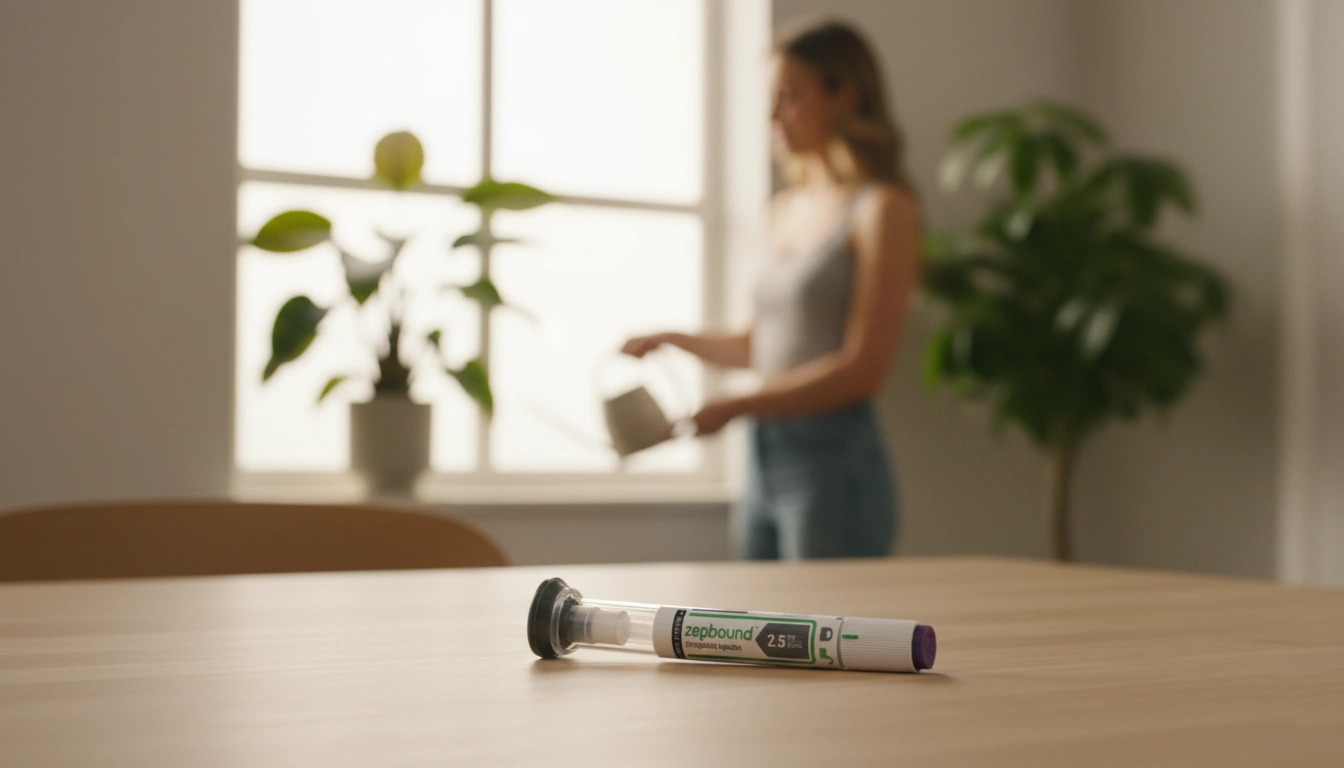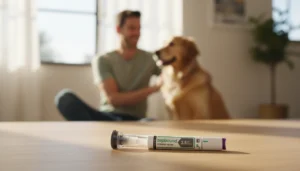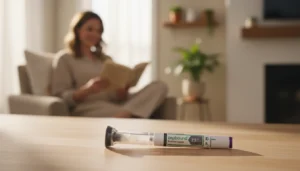Understanding Gastric Emptying: How Long Does Food Stay in Your Stomach on Zepbound?

Introduction
Have you ever wondered why some medications can affect how long food remains in your stomach? If you’re using Zepbound, a medication designed for weight loss, this question is particularly relevant. As we embark on this discussion, we will explore the intricacies of gastric emptying in relation to Zepbound, examining how this medication influences digestion and what it means for your weight loss journey.
When we eat, food travels through our digestive system, starting from the mouth and moving through the esophagus, stomach, and intestines. The rate at which food leaves the stomach and enters the intestines is known as gastric emptying. This process is crucial not only for digestion but also for how we feel after eating. The time food spends in the stomach can directly impact our feelings of fullness, hunger, and overall dietary habits.
Zepbound, which is a GLP-1 receptor agonist, works by slowing down gastric emptying. This can lead to prolonged sensations of fullness, which is beneficial for those looking to manage their weight. However, understanding how long food stays in your stomach while on Zepbound is essential for effectively managing your dietary choices and avoiding potential discomfort.
In this blog post, we will cover several important aspects:
- What is Zepbound and how does it work?
- The science behind gastric emptying and how Zepbound affects it.
- What to expect regarding food retention in your stomach while on Zepbound.
- Practical dietary recommendations for managing your meals.
- Common side effects related to gastric emptying and how to mitigate them.
- Conclusion and key takeaways.
- Frequently Asked Questions (FAQs).
By the end of this post, you will have a comprehensive understanding of how Zepbound influences the duration food remains in your stomach, allowing you to make informed dietary decisions that align with your weight loss goals.
What is Zepbound and How Does It Work?
Zepbound is a weight-loss medication that belongs to a class of drugs known as GLP-1 receptor agonists. It is designed for adults with a body mass index (BMI) of 30 or higher (obesity) or a BMI of 27 or higher (overweight) with weight-related medical conditions such as type 2 diabetes and hypertension. Zepbound functions by mimicking the action of a naturally occurring hormone in the body known as glucagon-like peptide-1 (GLP-1).
This medication influences several physiological processes:
- Appetite Regulation: Zepbound helps to reduce appetite, making you feel fuller with smaller amounts of food.
- Gastric Emptying: As we will delve deeper into later, Zepbound slows down the rate at which food leaves the stomach, prolonging the feeling of fullness.
- Blood Sugar Control: By enhancing insulin secretion and reducing glucagon levels, Zepbound helps stabilize blood sugar levels.
Understanding these mechanisms can empower us to navigate our eating habits more effectively while on this medication.
The Science Behind Gastric Emptying
Gastric emptying is a complex process that involves the coordinated action of the stomach muscles and the release of various hormones. Typically, after eating, the stomach contracts to mix food with digestive juices and gradually releases it into the small intestine. The time it takes for food to leave the stomach can vary based on several factors, including:
- Composition of the Meal: High-fat and high-fiber foods generally take longer to digest.
- Meal Size: Larger meals typically remain in the stomach longer than smaller ones.
- Individual Factors: Age, physical fitness, and overall health can also affect gastric emptying.
Research indicates that, under normal circumstances, food can stay in the stomach for anywhere from 2 to 6 hours. However, medications like Zepbound alter this natural rhythm.
Zepbound slows gastric emptying significantly. Studies have shown that individuals on GLP-1 receptor agonists may experience a delay in gastric emptying that can extend beyond typical durations. This can be beneficial for weight loss, but it requires careful management of meal size and frequency.
How Long Does Food Stay in Your Stomach on Zepbound?
The precise duration that food remains in the stomach while on Zepbound can vary from person to person. However, anecdotal evidence and clinical observations suggest that food may stay in the stomach longer than the average 2 to 6 hours observed in those not on this medication.
Several factors influence this extended duration:
- Initial Dosage: When starting Zepbound, your healthcare provider may prescribe a lower dose, allowing your body to adjust. During this adjustment phase, gastric emptying may be significantly delayed.
- Increased Dosage: As your dosage increases, your body will continue to adapt, but the effects on gastric emptying can persist, leading to prolonged fullness.
- Dietary Choices: The types of food consumed can also affect how long it stays in the stomach. Foods that are high in fat or fiber may remain longer compared to simpler, more easily digestible options.
Understanding these nuances can aid us in making informed choices about meal planning and timing to avoid discomfort or gastrointestinal issues.
Practical Dietary Recommendations for Managing Your Meals
Given the effects of Zepbound on gastric emptying, we can adopt several practical strategies to manage our meals effectively:
-
Eat Smaller, More Frequent Meals: Instead of three large meals, consider eating five to six smaller meals throughout the day. This can help prevent overwhelming your stomach and reduce the likelihood of discomfort.
-
Focus on Low-Fat, Low-Fiber Foods: High-fat and high-fiber foods take longer to digest. Choose lean proteins, fruits, and vegetables that are easier on the digestive system. Foods such as bananas, rice, and toast can be easier to digest and can help manage symptoms.
-
Stay Hydrated: Adequate hydration is crucial while on Zepbound. Drink plenty of fluids throughout the day to support digestion and avoid dehydration, especially if you experience gastrointestinal side effects.
-
Avoid Trigger Foods: Be mindful of foods that may exacerbate nausea or gastrointestinal discomfort. Spicy foods, greasy meals, and carbonated beverages can worsen symptoms, so it’s best to limit or avoid them.
-
Chew Thoroughly: Take your time while eating and chew food thoroughly to facilitate easier digestion. This can help ensure that food breaks down properly before entering the stomach.
By implementing these strategies, we can navigate our dietary choices while on Zepbound, maximizing the benefits of the medication for weight loss.
Common Side Effects Related to Gastric Emptying and How to Mitigate Them
While Zepbound can be effective for weight loss, it is essential to be aware of potential side effects associated with its impact on gastric emptying. Common side effects may include:
-
Nausea and Vomiting: These are among the most frequently reported side effects, especially when starting the medication or increasing the dosage. To mitigate this, we can follow dietary recommendations, such as eating smaller meals and avoiding high-fat foods.
-
Diarrhea: Some individuals may experience diarrhea as their body adjusts to Zepbound. Staying hydrated and consuming bland foods can help manage this symptom.
-
Constipation: Conversely, Zepbound can also slow down bowel movements, leading to constipation. Increasing fiber intake and hydration can promote regularity.
-
Stomach Pain or Discomfort: If we experience significant stomach pain, it is vital to reach out to a healthcare provider for guidance and support.
Understanding these potential side effects allows us to take proactive measures to manage them effectively while on Zepbound.
Conclusion and Key Takeaways
Navigating weight loss with Zepbound requires a deeper understanding of how this medication influences gastric emptying. By recognizing that food may stay in the stomach longer than usual, we can make informed choices about meal timing, composition, and portion sizes, all of which contribute to our overall success.
To summarize, Zepbound effectively slows gastric emptying, leading to prolonged feelings of fullness that can aid in weight loss. However, it is essential to adapt our dietary habits to manage potential side effects and enhance our experience on this medication.
Incorporating smaller meals, choosing easily digestible foods, and staying hydrated are just a few strategies we can embrace to optimize our weight loss journey with Zepbound.
FAQ
How long does food generally stay in the stomach while on Zepbound?
Food may stay in the stomach longer than the typical 2 to 6 hours observed in those not on the medication, depending on individual factors and dietary choices.
What should I do if I experience nausea on Zepbound?
Consider eating smaller meals, avoiding high-fat foods, and staying hydrated. If nausea persists, consult your healthcare provider.
Can I still enjoy my favorite foods while on Zepbound?
While it’s essential to be mindful of dietary choices, many foods can still be enjoyed in moderation. Focus on balanced meals that promote digestion and satiety.
What dietary adjustments can I make to ease constipation while on Zepbound?
Increasing fiber intake through fruits, vegetables, and whole grains, along with ensuring adequate hydration, can help promote regular bowel movements.
Are there any risks associated with taking Zepbound?
As with any medication, there are potential side effects. It’s essential to consult with your healthcare provider to discuss any concerns and ensure that Zepbound is a suitable option for you.
In summary, understanding how long food stays in your stomach on Zepbound equips us with the knowledge needed to navigate our weight loss journey effectively. Together, we can embrace a healthier lifestyle while managing the unique challenges that come with medication.

Transforming Lives, One Step at a Time
Keep reading
Navigating Your Path: How Many Doses Are In Zepbound and What It Means for Your Health Journey
Curious how many doses are in Zepbound? Discover its weekly dosing schedule, available strengths, and titration process for effective weight loss. Learn more!
Navigating Your Zepbound Journey: Understanding Dosing and Expert Guidance
Wondering how to split doses of Zepbound? Learn why it’s unsafe & not recommended. Get expert guidance on Zepbound dosing for safe, effective weight loss with TrimRx. Click to learn more!
Understanding Zepbound Dosing: What is the Lowest Dose Available for Your Weight Loss Journey?
Curious what is the lowest dose of Zepbound available? Learn about Zepbound’s 2.5mg starting dose, titration, and safe use for weight loss. Get expert guidance!



